Director Brett Haley discusses Hearts Beat Loud and the joy of nice movies about kind people.
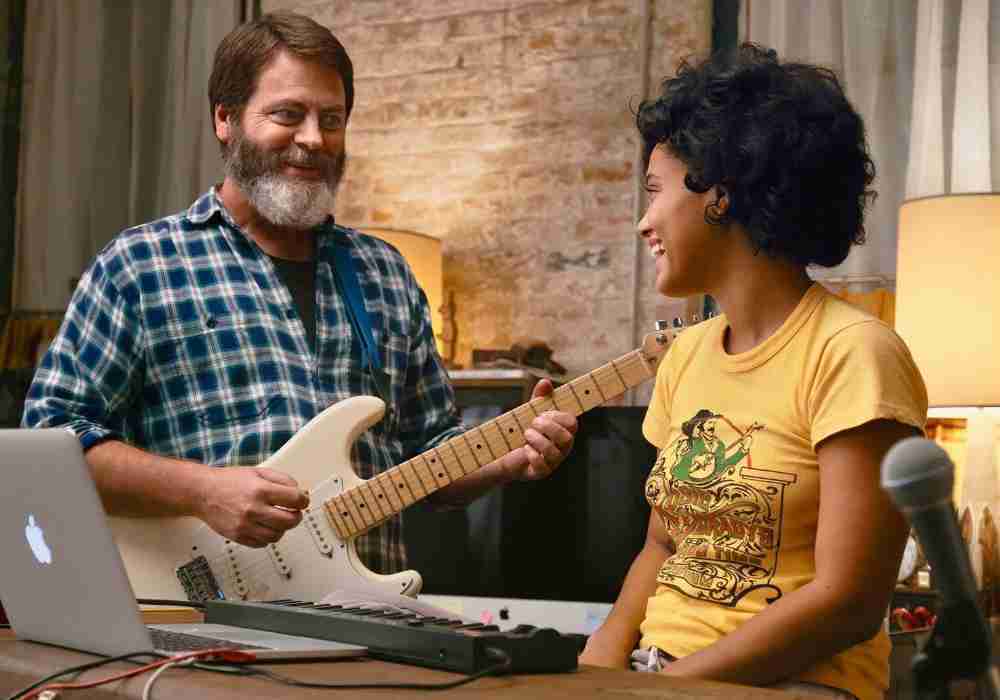
Director Brett Haley has built a promising career on cinematic comfort food. His are the kinds of movies you put on to feel warm inside — to laugh, and maybe shed a tear or two, but never too many to leave you in despair. I’ll See You in My Dreams (2015) and The Hero (2017) both followed pensioners dealing with the reality of aging. Haley’s latest, Hearts Beat Loud, is the same kind of character-driven dramedy but with a younger appeal and with music brought to the foreground.
Sam (Kiersey Clemons) is spending her last summer in her New York home before moving cross country to study at medical school. Her father, Frank (Nick Offerman), is saying goodbye to both his daughter and his record shop, which he can no longer afford to keep. Growing up and adapting to changing times are problems we all face at some point; it’s not traditional movie conflict because it’s so small-scale and there’s no point even trying to fight against it. But these characters (and the wonderful actors who play them) are a delight to be in the company of as they say goodbye to the things they love and welcome new adventures. Sam has a brief romance with artist Rose (Sasha Lane); Frank wants to start a band with his daughter. It all has to end soon, but it’s beautiful while it lasts.
I spoke with Haley about telling stories that lack traditional conflict, depicting father-daughter relationships in cinema, and the joy of ‘nice’ movies.
Seventh Row (7R): I’ll See You in My Dreams, The Hero, and Hearts Beat Loud are all warm, melancholic films about things coming to an end. Why do you find those emotions so cinematic?
Brett Haley: I’m very interested in transitions. Life — when you really break it down — is just a series of adjustments and transitions.
There are things that change every day. In America, we have to transition and deal with the fact that Donald Trump is our president, which has had a profound effect on many people’s lives. It can be something like that, or it can be a death, or an illness, or a kid going off to college. To me, those are the moments that define humanity and define what it means to be alive.
These three films I’ve done in a row — four, if you count my first movie, if anyone’s actually seen it — go together. I have maybe one more of this nature that I’d like to make at some point, but I think I’m moving on from this a bit. I’ve said the things I needed to say.
[click_to_tweet tweet=”‘Life — when you really break it down — is just a series of adjustments and transitions.'” quote=”‘Life — when you really break it down — is just a series of adjustments and transitions.'”]
7R: Hearts Beat Loud is very nostalgic, but not in the sense that is romanticizes the past and refuses to look beyond it. There’s a fondness and deep love for the way things were, but also a willingness to move on and adapt. Even down to the presence of physical media: Frank works in a record store but he doesn’t look down on modern ways of listening to music. Their song gets exposure on Spotify.
Brett Haley: [Co-writer] Marc [Basch] and I sat around saying, “How can we make [their song] become the tiniest bit of a thing?” Getting your song on Spotify’s New Indie Mix, [as Sam and Frank do in the film,] is not that big of a deal. It is but it isn’t. But it is the 2018 equivalent of getting your song on the radio. It’s like, “Somebody out there likes this song. Maybe there’s a world for it.”
I think the film embraces where music is at right now, while being very warm and kind to where music has been. The fact that people are buying vinyl again is great. Music and film deserve respect for where it came from. That’s why we’re seeing these 70mm prints. But at the same, what’s happening with Netflix — it’s OK! We’re still getting movies made, it’s great! I’m discovering artists I would never have discovered if not for Spotify. I think it’s great! You’ve got to embrace both.
7R: The film is very life-sized. Because Sam is such a talented musician, I think a lot of films would turn this story into the discovery of a superstar. But she doesn’t want that — she just wants to study medicine, and the film doesn’t judge her for that.
Brett Haley: Well, that’s the normal narrative, right? Because we all have stars in our eyes, the carrot that’s constantly hung in front of characters in film and TV throughout history is fame. Fame and money. I thought, “I’m going to go out of my way to not do that, to make this about creativity, connection, and love.” That’s the carrot that’s hanging in front of Sam and Frank. We do toy with, “Oh, maybe we can make this a thing,” but there’s never any illusion of, “We’re going to be famous.” With this story, we wanted to carve out our own little space where the music is for its own sake.
There’s a shot in the film where they start finding the beat or the rhythm or the melody for [the song] “Hearts Beat Loud”. It’s this long shot where they’re figuring it out. It’s just two people who are on opposite sides of the frame, and by the end of the shot, they’re almost on top of each other in the frame. That’s what this movie’s about. It’s about this idea that music and creation and creativity of any kind can bring people together. That was the thing that, for me, was bigger than fame or money or anything else. That’s why they played to 30 people in their record shop, not at a Battle of the Bands or whatever.
[click_to_tweet tweet=”‘We wanted to carve out our own little space where the music is for its own sake.'” quote=”‘We wanted to carve out our own little space where the music is for its own sake.'”]
7R: I heard that you collaborated with the actors on the script. Was that earlier on in the scripting process? Or did it take the form of on set improvisation?
Brett Haley: There wasn’t a lot of improv, no. Most of the collaboration comes in rehearsal, when you’re basically saying to the actors, “Does this feel real and organic coming out of your mouth?”
The biggest collaboration was with Kiersey and Sasha, because they’re both women of colour, and they both identify as queer. I found it to be a great gift that they were like, “Oh, we relate to these characters.” Mark and I basically just listened to what they had to say about what it means to be a queer person of colour in love. More than anything, we just heard their experience of, “This feels real,” or, “We wouldn’t talk about this,” or whatever, and then we incorporated those ideas into the script.
We kind of rewrote those scenes. I wouldn’t say it was total rewrites, but we cleaned them up. Mostly, we just cut stuff, dialogue that felt superfluous. They really helped to define the reality of those characters and their romance. I’m very grateful to them. I think more people in my position, with my privilege, should do that: listen, take note, and do the best that they can.
[click_to_tweet tweet=”‘Music and creation and creativity of any kind can bring people together.'” quote=”‘Music and creation and creativity of any kind can bring people together.'”]
7R: My favourite thing about the film is how nice it is. I don’t think there are many truly nice movies. There’s no person in the film that’s an antagonist. The only conflict is time and circumstance. Even the landlady who has to raise their rent is their friend.
Brett Haley: I think it’s important to have a reminder that most of us are nice. Even people that you disagree with, we’re all trying our best. There’s plenty of movies out there — and there will be forever — that depict good and evil, bad people doing bad things. And somehow, that is considered cool. I don’t know who made that rule, that that’s cool, and that movies about people who are trying their best are uncool. But fuck it!
I look around at the world, and I’m sad. It’s upsetting. I like to be reminded that most people that I know are good people, just trying their best, trying to understand, trying to make a living, trying… and failing a lot of the time, but trying. It’s not a calculated thing that I’m doing. Marc and I don’t write these scripts like, “We’re going to make everyone so nice.” It just comes from us.
[click_to_tweet tweet=”‘More people in my position, with my privilege, should do that: listen, take note, and do the best that they can.'” quote=”‘More people in my position, with my privilege, should do that: listen, take note, and do the best that they can.'”]
Putting in faux conflict just feels false to me. I stop and I’m like, “I can’t do this.” I can’t have the dad be upset with his daughter because she’s queer, just because that’s conflict.
There’s nothing but conflict in the film. It just plays out in a real way, rather than a formulated, “Here’s how you write a screenplay” kind of way. There’s tons of things that make it incredibly difficult on the characters. But at the end of the day, time marches on.
I think Richard Linklater’s a master of time. Time is the thing, whether it’s too little or too much. What’s the conflict in Before Sunset, other than time? It’s not like there’s this insane, big discovery and some character’s like, “You did what?!” It’s just this moment of connection and then, “Oh my god, what are we going to do?” To me, that’s bigger than some faux external conflict. If you’re making a movie about superheroes, please give me all the external conflict you can. But in movies about real people and real, human situations — shit happens and you’ve got to deal with it.
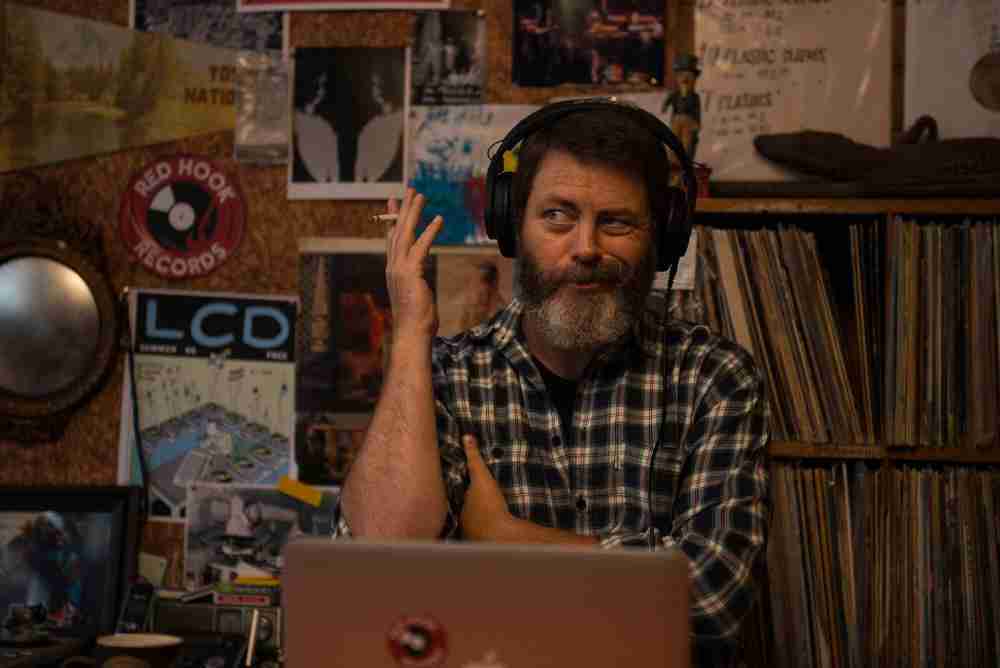
7R: I feel like there’s a growing number of caring, supportive father figures in cinema, and people are really responding to it. Just this year, your film and Bo Burnham’s Eighth Grade show us incredibly loving and aspirational single dads.
Brett Haley: Growing up, I had a complicated scenario with dads. I think a lot of us have difficult relationships with dads, because men in general are usually not that great. I think they have difficulty being good fathers, off the bat. That’s a generalisation, but I think, overall, that’s pretty truthful. There are some dads that can just pop right into it, and they’re natural born dads — and there are other people that just struggle with it. It’s not inside of them to respond immediately. For whatever reason, there are more absent fathers than absent mothers.
Frank is a great dad. He’s really sweet, but he’s also fucked up and flawed. I think creative people respond to Frank, because he’s like, “Let’s be in a band!” instead of, “Do homework.” He’s like, “No, fuck it! Let’s play guitar! Let’s do this thing together!” It’s really fun to see Nick embrace that childlike wonder. Dads don’t usually do that. They’re usually the voice of quote unquote reason. I love that he’s totally unreasonable, but in this very sweet way. And he obviously does the right thing when the right time comes. Again, it’s like, isn’t it nice to have a reminder of something good?
[click_to_tweet tweet=”‘Time is the thing, whether it’s too little or too much.'” quote=”‘Time is the thing, whether it’s too little or too much.'”]
7R: The father-daughter relationship feels so lived in. You get a real sense of history, both from the actors and from the way their apartment is decorated — it’s so full of personality.
Brett Haley: It’s important to give the audience power to put the pieces together. A lot of movies feel like the audience needs to know all the information in the first 10 minutes. Mark and I prefer to have the audience figure out what’s going on and let them put it together. That’s a lot more organic and interesting, as a viewer.
I’ll shout out to my amazing production designer, Erin Magill. She did an incredible job on the film, with very few resources. This movie was made in 18 or 19 days, for very little money, and everybody on board was just so game to make it work.
[click_to_tweet tweet=”‘I think a lot of us have difficult relationships with dads, because men in general are usually not that great.'” quote=”‘I think a lot of us have difficult relationships with dads, because men in general are usually not that great.'”]
If you look at what’s on the walls, there’s detail that goes really far back. There are two lockers: one says ‘FF’ and the other says ‘DF’. That’s for Frank Fisher and Danielle Fisher, [Frank’s deceased wife]. So you know that he and his wife had these little cute lockers at some point. Then there’s obviously the photos and everything… the apartment just has a lived in quality.
The same thing with the record store. We show the height chart, which creates a very sweet moment where Sam is looking at it like, “Oh, this is like a piece of me that’s going away.”
But also, Danielle, Frank’s wife and Sam’s mom, is all over the movie, if you look for her. She’s everywhere. Because that’s how it would be. That’s how you remember people. You put them up on the walls.
[click_to_tweet tweet=”‘Frank is a great dad. He’s really sweet, but he’s also fucked up and flawed.'” quote=”‘Frank is a great dad. He’s really sweet, but he’s also fucked up and flawed.'”]
7R: The film is full of warm, bright colours. How did you choose that striking and memorable colour palette?
Brett Haley: It’s the feeling of it, right? The feeling of the movie is these colours. Melissa Vargas, my costume designer, started showing me stuff, and I kept gravitating towards the yellows and the reds and the blues… colours that popped. Colour gives you a good feeling, when the spectrum hits your eyes. I just wanted it to feel warm, inviting, colourful, and vibrant.
I didn’t want to be too fancy with the camera. That felt false. Also, we didn’t have time. So I thought, “What can I do to make each frame delicious? I’m going to put a lot of colour in the frame.”
[click_to_tweet tweet=”‘I just wanted it to feel warm, inviting, colourful, and vibrant.'” quote=”‘I just wanted it to feel warm, inviting, colourful, and vibrant.'”]
I think my favourite shot in the movie — the shot that a lot of people have loved and commented on — is that overhead shot [of Sam and Rose] in bed. That’s a beautiful combination of Erin choosing this very odd bed pattern and these pillows, and then Melissa putting Sasha in the bright yellow and Kiersey in that maroon. And then Eric Lin, my DP, lighting it perfectly and framing this overhead shot. It looks like a little painting.
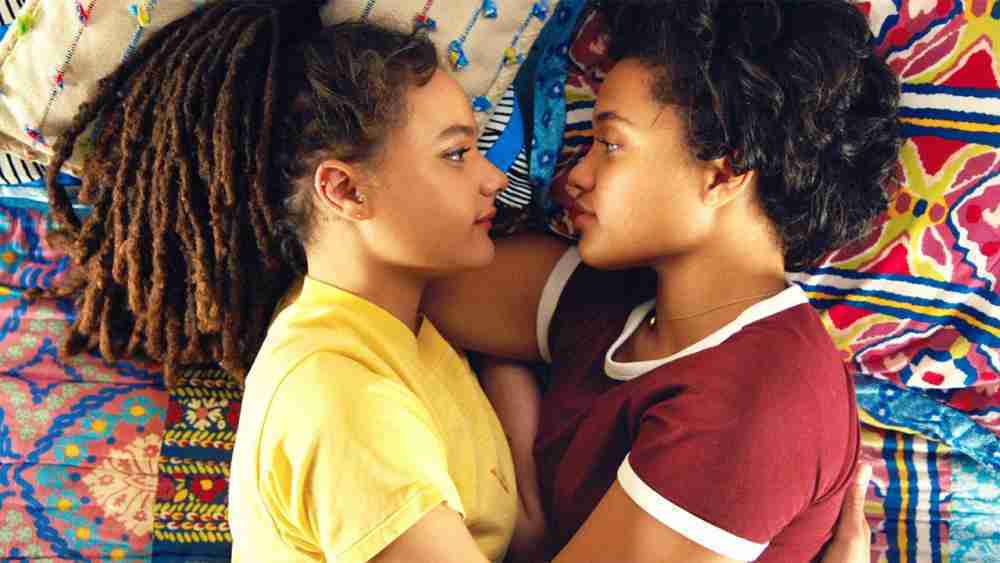
7R: How did you approach filming the scenes of jam sessions and musical performances? They don’t feel like rehearsed, stylised music videos — there’s a real sense of spontaneity and creation.
Brett Haley: I took a lot of video of Keegan [DeWitt] and Jeremy [Bullock]. Keegan wrote all the songs and Jeremy helped, not only with making sure that it all felt real onset, but also with the writing of some of the songs. I would watch Keegan and Jeremy working on the songs, and I’d get ideas. There’s that part in the film where Frank’s playing the bass, and Sam’s like, “No, it’s faster than that,” and then he does that and she’s like, “No, double time. No, double the length.” So I put that stuff in the movie because it felt real.
Hopefully, when you see the creation of “Hearts Beat Loud”, you buy it. I didn’t want them just pulling this song out of their ass. You see the melody happen. You see where the lyrics come from. You see how you could put a song of that level together with just two people in their living room, with a computer and a couple instruments. Also, in the performances, it’s live vocals. I tried everything I could to make it feel as real as possible.
Keep reading about great queer cinema like Hearts Beat Loud…
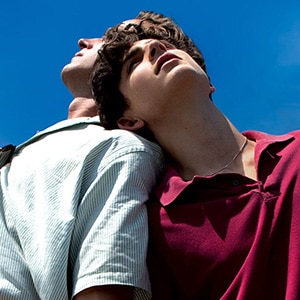
Call Me by Your Name
Read Call Me by Your Name: A Special Issue, a collection of essays through which you can relive Luca Guadagnino’s swoon-worthy summer tale.
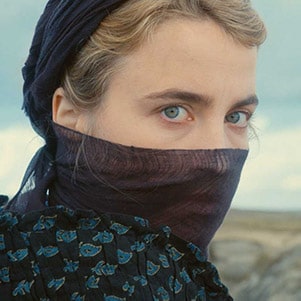
Portrait of a Lady on Fire
Read our ebook Portraits of resistance: The cinema of Céline Sciamma, the first book ever written about Sciamma.
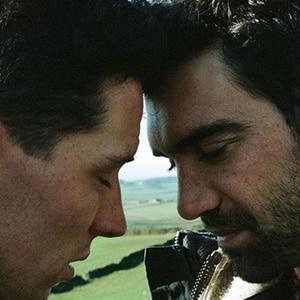
God’s Own Country
Read God’s Own Country: A Special Issue, the ultimate ebook companion to this gorgeous love story.
Many of our favourite feel good movies are also rich in colour like Heart Beats Loud. The modern rom-com Maggie’s Plan fits this bill, and we talked to director Rebecca Miller about developing that colourful world through costume design and production design. Mina Shum’s Meditation Park is another film that will have you fist pumping (and weeping) by the end, and it’s full of gorgeous yellows and blues to complement the Vancouver setting. Toronto-set rom-com The F Word is populated with bright reds and blues, ensuring this is very much a world you want to live in. The Israeli rom-com about an Orthodox Jewish woman in search of a last-minute husband, The Wedding Plan, covers its heroine in rich pinks and greens to complement her bright personality.

